In a year Russia will be electing a new president. Despite the fact that the majority of experts discount the Internet as a decisive factor in the election, the role and sensitivity of the Internet is increasing as elections come closer.
The number of worrying events is also gradually increasing, including Distributed Denial-of-Service [DDos] attacks against websites, new scandals surrounding the anti-corruption activity of blogger Alexey Navalny, government initiatives for Internet control, and threats made by Russian security services towards popular western websites and tools.
At the same time, Russian leaders are trying to convince the public that they have no intent to control the Internet. On April 20, 2011, Vladimir Putin, Russian prime minister, said [ru] the government had no intent to “cut” (read: restrict) the Internet. Although, he specified that it was his opinion, not that of the security services.
The President on the Internet
Putin’s explanation took just one minute. It took President Medvedev 157 minutes and 20 seconds – the length of his recent meeting with representatives from the Russian Internet community in the Moscow Youth Library on April 29, 2011 – to do the same (full transcript [ru] and video [ru]).
As a co-founder of Russian “Help Map” project I was invited to participate in this meeting, so the following text is a mix of report, analysis and my personal account.
The president's starting statement at the meeting was very short, but it defined a framework of the conversation as consultation:
Свою задачу я в чём вижу? Задача Президента – в том, чтобы принимать более или менее правильные решения в области регулирования любых общественных отношений, в том числе и в области интернета. Но интернет – настолько специфическая среда, что, как только начинают говорить о её регулировании, сразу возникает ощущение, что это государство свою лапу хочет наложить и создать такие условия, которых нет почти нигде, кроме специфических стран. Поэтому любое регулирование всегда сопровождается довольно серьёзным обсуждением.
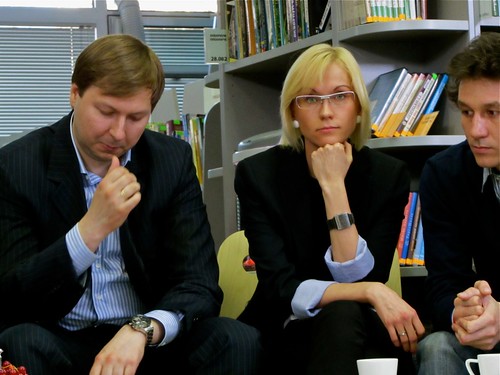
Dmitry Grishin (Mail.ru) and Svetlana Ivannikova (LiveJournal.com). Image by Gregory Asmolov (CC BY-NC 2.0).
The discussion had no restrictions. Two issues that were defined in advance as starting points were anonymity and the copyright. All the participants could raise any additional topic they wanted to, but the range of the topics was defined by those who were invited.
The guest list included [ru] heads of IT services (e.g. LiveJournal, Facebook and Mail.ru), chief media editors (e.g. RIA-Novosti, Lenta.ru, Gazeta.ru, Kommersant), leaders of state-affiliated Internet governance structures, charity and citizen Internet projects, Moscow State University and just one (though top-ranking) blogger.
Copyright
The most promising topic of the meeting was copyright. The Russian president had found out about the Creative Commons (CC) concept and expressed a great deal of interest in it. Not only he did he suggest a check on how CC can be applied to Russian law, but he also proposed to raise the issue of new forms of copyright at the next G8 meeting.
Svetlana Mironyuk, head of Russian governmental news agency RIA-Novosti, announced that her agency will allow bloggers to use its content under CC license. The participants mentioned that while the Western media try to restrict access to content and find new ways for monetization, Russian media do not forget about the public good and work on finding balanced approach to the issue.
At the same time, Head of Russian Wikimedia foundation, Stanislav Kozlovsky, explained that since Russian law does not recognize CC at this point, services such as Wikipedia have legal problems in Russia.
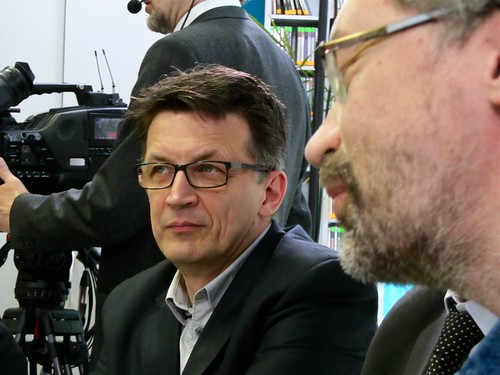
Rustem Adagamov (LJ-user Drugoi), one of the most popular Russian bloggers. Image by Gregory Asmolov (CC BY-NC 2.0).
Anonymity and government's impact on the net
The second issue on the agenda was online anonymity. Speaking of the balance between anonymity and a need for online identification, President Medvedev was very careful and diplomatic:
Я, конечно, опасаюсь, что у нас этот баланс может быть свёрнут в определённом направлении в силу опять же нашей достаточно бурной и сложной истории. Но, с другой стороны, и обратная крайность тоже опасна.
Two important issues were raised. First, the responsibility of the media outlets for user comments and quoting blogs as information sources. Second, the recent DDoS attacks against LiveJournal. Medvedev denied any government involvmennt:
Это, во-первых, всё плохо, безусловно, потому что это создаёт очень нервозную обстановку, и все нервничают. Нервничают, собственно, те, кто пострадал, потому что они видят в этом чьи-то происки, не важно чьи: власти, ФСБ, Администрации Президента, ЦРУ, ещё кого-то. Нервничает власть, которая не понимает, как на это всё реагировать, потому что не хочет, чтобы её упрекали во всякого рода «зажимах». Вопрос в том, есть ли эффективный способ противодействия этому. Вы же понимаете, у нас в силу того, что вообще такое из себя представляет интернет, у любой власти нет ресурса влияния на тех, кто, например, хочет этим заняться, может быть, даже исходя из каких-то своих абсолютно твёрдых представлений. Видеть за этим канализированную атаку, которая, скажем условно, благословляется где-то в той или иной структуре, надеюсь, что присутствующие здесь понимают – это не то что упрощение, это просто неправильно.
Society and government online
Anton Nossik, Internet enterpreneur and the founder of the charity website pomogi.org, pointed out that unlike the United States, Russia has no tax exemption for charity donors. Dmitry Medvedev recognized the importance of this issue but argued that in the Russian reality this type of exempt can be a subject to manipulation and tax evasion. Following a long discussion, Medvedev asked Nossik to send him a specific proposal how the exempt should be formulated.
As a co-founder of the “Help Map” project I raised the issue of the government’s openness for cooperation with citizen projects. I argued that in 2010, during the wildfire crisis, Russian network society proved it could be a powerful actor in emergency management. The state, however, approaches the Internet as a sphere of online services for citizens, but not as a space for collaboration with the civil society.
I also mentioned Gdecasino.ru, a crowdsourcing project for monitoring of illegal gambling sites, that was taken into account by the Prosecutor's office only after President Medvedev talked about it with the General Prosecutor. Medvedev recognized the importance of collaboration, but pointed out that the openess depended on government officials:
Вы знаете, это проблема самих людей, которые работают на государство. Мне было бы очень грустно, если бы для каждого такого государственного взора необходимо было бы участие Президента. […] Мне кажется, это вопрос скорее общего взросления людей. Я единственное, что могу обещать, я своим примером, естественно, это буду продолжать делать. Но, в конечном счёте, это вопрос самоощущения самих министров, руководителей ведомств. Если они не хотят остаться на свалке, то они должны реагировать на это.
Library debates: insights
Firstly, one of the major impressions from the meeting was of the friendly and open atmosphere. It was very obvious that President Medvedev felt comfortable in the company of IT people. He was familiar with the majority of issues and wanted to talk about them.
He mentioned a few times that he is an experienced Internet user and advocate, who believed many years ago in the power of the Internet. The informal design of the meeting was especially surprising, due to the fact that the meeting was covered and filmed by the media.
Many participants live blogged and tweeted the meeting (it wasn’t easy since we were sitting in a circle without tables, very close to each other and were not able to use laptops).
Secondly, the Russian president showed himself as a person who is particularly interested in the legal aspects of every issue. It should not be a big surprise due to his legal background. Once a problem had a legal application or solution that required a change of legislation, Medvedev was ready to go deep into details (such as the issue of Creative Common licenses).
If the problem was not purely legal and required a political decision, the reaction was different. To some extent, one may conclude, the approach of Russian president to his role is primarily based on the concept that the change can be achieved through legal regulation.
It is a little paradoxical in this particular case, since President Medvedev recognized Russian legal nihilism many times. The participants referred to United States legal experience (e.g. with charity and tax regulation). However the president explained why, according to his point of view, it would not work in a country like Russia. Medvedev complained about government structures that are not willing to change their approach:
В целом ведомства с очень большим скрипом свои подходы в этом смысле меняют. Я могу их чисто по-человечески понять. Каждое из них бьётся за какие-то свои позиции, за своё место под солнцем, они стараются показать свою нужность и так далее.
Medvedev also argued that initiatives to develop “Made in Russia” software by government structures are not efficient and have become a business for them. He also said that the people who work for the government have a problem with understanding the importance of the Internet.
On one hand, the fact that the president publically acknowledges that the system and those who work in it have very significant problems is important. On the other hand, sometimes it looks likes that this acknowledgment is a way to give an excuse for the lack of action and executive decisions, especially if the approach to reforms is focused on the legislation process.
It might seem that Russians have a president who is focused on legal change, and at the same time is questioning the ability of the government and society to follow the law.
Real intent? Real impact?
The meeting raised a lot of important issues and sent many positive messages in regard to the role of the state in the Internet. The fact that the president is interested in the Internet and found three hours of his time for an open conversation should be more than welcomed. This, however, might not be enough.
First of all, society should monitor and observe if the meeting has any real consequences: adaptation of Creative Commons license to the Russian law, tax exemption for charity donors or meeting between media and the investigators of the DDoS attacks. Secondly, it should be recognized, what issues were not raised at this meeting and who were not invited.
Many members of the Russian Internet community approached the meeting with a high degree of skepticism. Maria Snegovaya, a PhD student at the Higher School of Economics wrote on Facebook:
[…] на этих встречах обеим сторонам очень хочется делать вид, что мы – нормальная страна. И что президент принимает конструктивные замечания от заинтересованных групп населения, и вносит поправки в законы. Но это же фигня. Вы встречаетесь с мини-диктатором, который мимикрирует под цивилизованного демократического лидера который управляет системой, ежедневно нарушающей права тысяч людей. Ему нужно сказать, хотя бы намекнуть, что он-диктатор […]. Если это не могут сделать даже лучшие из нас – чего ждать от оставшейся части общества?
Some particular events that took place after the meeting questioned the credibility of Medvedev's statements. On May 2, a scandal broke out regarding the leak of the private data of anti-corruption contributors which was allegedly carried out by the Federal Security Service (FSB) (read a detailed analysis here).
Alexey Navalny, a high profile anti-corruption blogger (who was not invited to the meeting), recalled that Medvedev denied any allegations of involvement of the FSB or presidential administration in the DDoS attacks or any other problems reported to his project rospil.info. He wrote [ru]:
Это блоггер Медведев, которого некоторые называют еще “Президент Медведев” […] Совсем недавно он занимался своим любимым и единственным занятием: безответственно болтал. […]
Напомню, что именно блоггеру Медведеву подчинаются и ФСБ, не нашедшее более важного занятия, чем охота за данными РосПила и администрация президента, где сидит всё это отвратительное жулье и ворье, руководящее “нашими”. Предлагаю блоггеру Медведеву за свои слова отвечать и решить уже: он способен контролировать тех, кто подчиняются ему по закону?
This is blogger Medvedev, also known as “President Medvedev” […] Not so long ago he did his favorite and the only thing: talked irresponsibly […]
Remember that it is blogger Medvedev that controls the FSB, that wasn't able to find more important things to do than searching information about rospil.info. He also controls the presidential administration that hosts all these disgusting thiefs and crooks who manage “Nashi.” [youth movement] I suggest that blogger Medvedev should start to be responsible for his own words and decide if he is capable to control those who have to obey him according to the law.
The blogger suggested that Medvedev should either do what he is paid for and take the security services under his control, or, if he is not able to do it, to leave the presidential post.
The question if Medvedev really had good intentions towards the Internet and if he is able to implement these intents, remains open. It would be difficult to disagree with his closing words (and his anonymous commenter):
Д.МЕДВЕДЕВ: Знаете, наша беседа навела меня только на один вывод – я всё-таки уверен, что у нашего интернета всё равно будет своя, особая судьба, которая будет трудной, но очень интересной.
РЕПЛИКА: Главное, чтобы она была счастливой.
Д.МЕДВЕДЕВ: Сомнений нет, будет счастливой.
D. Medvedev: You know, our conversation has led me to only one conclusion – I am convinced that our Internet will have it's own, special destiny, that will be hard, but very interesting.
Someone: The main thing is that it will be happy.
D. Medvedev: I have no doubt that it will be happy.

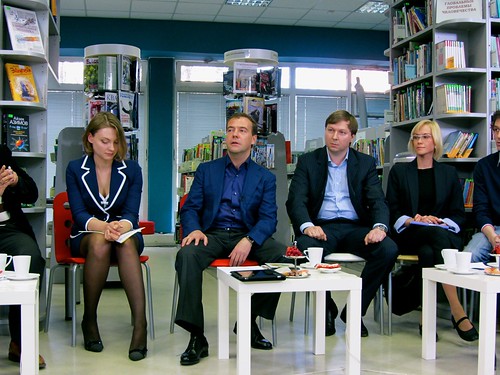
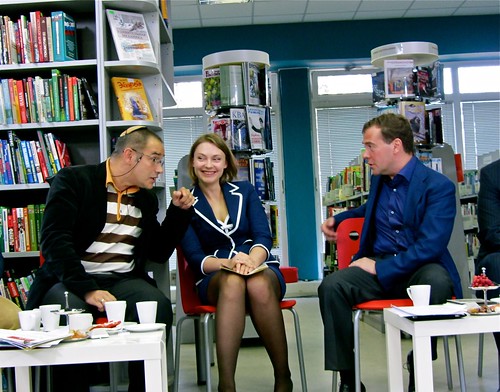
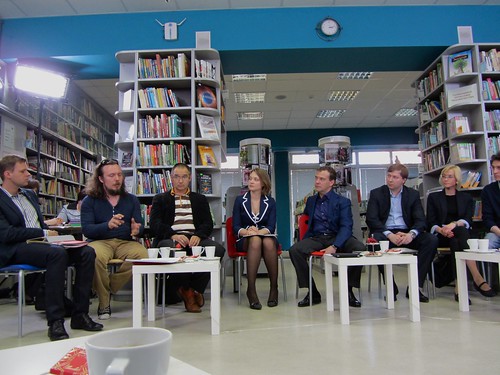
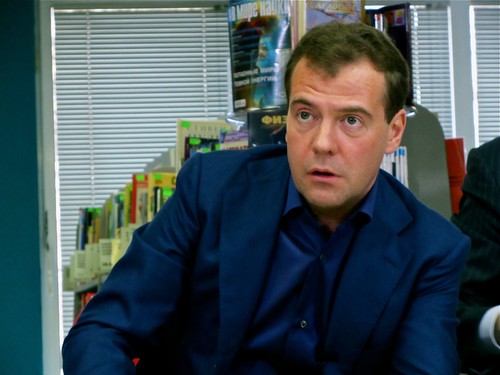







7 comments